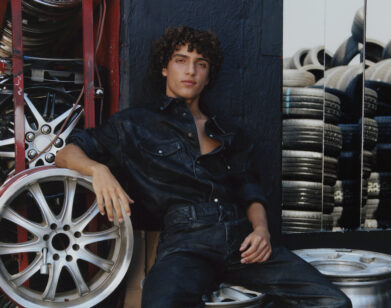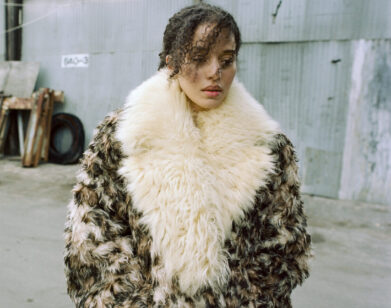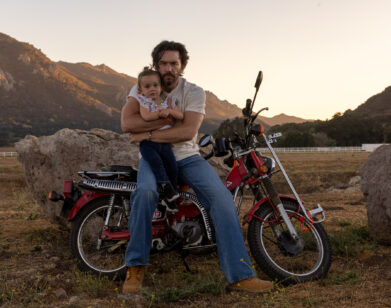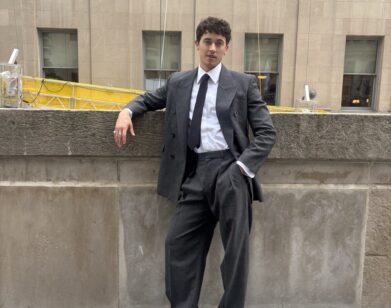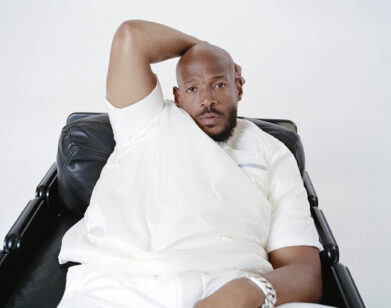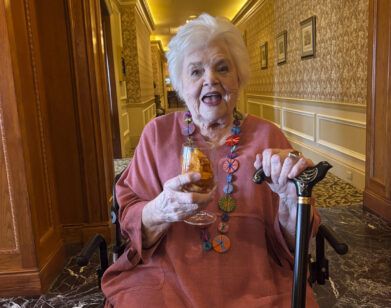A Lily Grows in New York
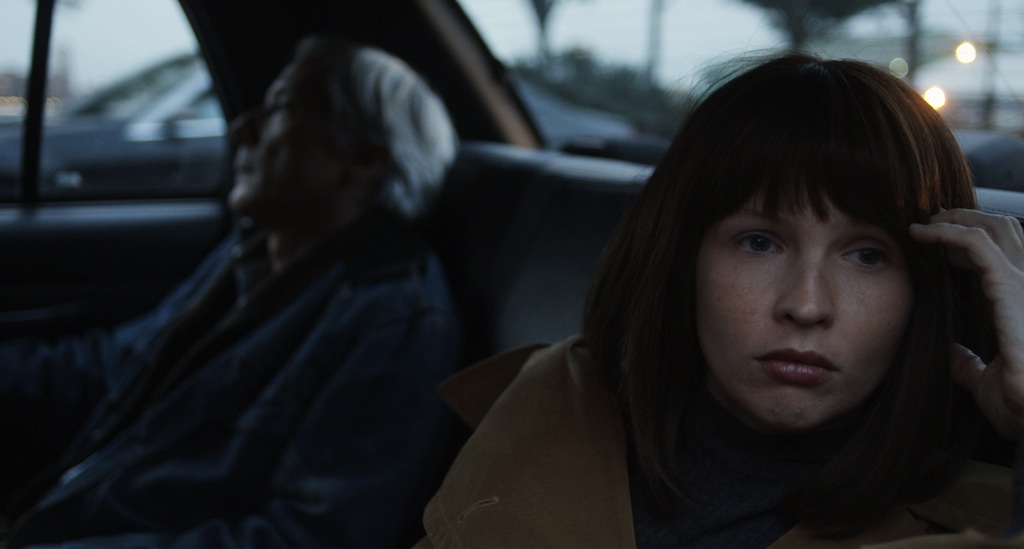
ABOVE: AMY GRANTHAM IN LILY
Matt Creed’s debut feature, Lily, which premieres this weekend at the Tribeca Film Festival is the story of a woman (played by co-writer Amy Grantham) who, approaching the end of cancer treatment, feels both an unwieldy sense of anticipation and uncertainty. Thrown off balance, Lily wanders. One minute she’s looking especially like Jean Seberg with her flaxen shorn hair, gleefully tap dancing at home. The next she’s tossing on her wig, haphazardly making vacation plans or applying for a job or cooking for her boyfriend, or regretting a drunken night.
The film is also Creed’s thoughtful ode to New York. His is an ochre-hued city that sounds just as chaotic as it sounds quiet. A rambling man talking to himself on the street or the hum of an approaching train whooshing by—sometimes dulling, sometimes startling—is the same New York in which an apartment in the afternoon can seem near-holy, as if invented for friends to hide in without motive; to keep a secret.
Shot by Brett Jutkiewicz (Daddy Longlegs, Towheads), Lily, like its protagonist, emerges hesitantly. It leaves room for the audience to experience, at a moment’s notice, what happens when the city pulls you in all directions, but also, the upshot and unlikely boon of staring in one direction long enough.
DURGA CHEW-BOSE: So let’s start with the script and co-writing it with Amy. Can you tell me a bit about how that came to be and how you worked out writing together? Was this her story?
MATT CREED: This is her story. How it all came about was I knew Amy from seeing her around. One day I asked her how she was doing and she said she was doing “alright.” But then she said, “Well actually I got diagnosed with cancer.” I mean what do you say when someone tells you that? And so she told me to check out this blog that she had called, Boo Cancer You Suck, and I started following it. She’s an amazing writer; the way she writes just flows so perfectly. Anyways, long story short, I hadn’t seen her since she finished chemo, and she was telling that her treatment was coming to an end, and I said, “You must be super happy,” and she just said, “No. No I’m not happy.” She started saying that it was her greatest achievement in life and that it was the only thing she’d ever finished from beginning to end. I went home and just thought about everything she said for days. I couldn’t figure out why I was relating to her but then I realized I was relating to her vulnerable headspace. At the time I was the most vulnerable I had ever been in my life having just gone through a break-up, and I just thought, while it could give you clarity, surviving a disease, it’s really the vulnerability of that that gives you the clarity. For me at least, that’s how I see it. And then we started writing it. And I didn’t really know anything about cancer treatment, and if I was relating to her, I thought maybe anyone could relate to her. So that’s where the collaboration came from.
CHEW-BOSE: Lily’s day to day is set against her cancer—
CREED: Yeah, I didn’t want to make a cancer film. But I was very interested in exploring that side of cancer, and she was really interested in doing it this way as well.
CHEW-BOSE: And the rest? The New York that you’ve painted, was it a collection of stuff you’ve been jotting down in a notebook?
CREED: The New York stuff is my New York. For me, everything in this city happens in passing but it sticks with you. Even last night, I was walking by a guy and all I heard him say was, “Yeah, and he got shot in the leg!” and that was my snippet. So it was important to make New York feel very present but also very subtle.
CHEW-BOSE: And what about the voice recordings that trickle in? Do you also record strangers on the street? Or were those Amy’s?
CREED: I do that and Amy does that. The pace of the movie is set to her train of thought and the way she thinks. So it starts of kind of slow and then as it goes on, and she can start thinking faster and she knows more of what she wants, the pace picks up. So do the recordings.
CHEW-BOSE: Yeah I noticed that two-thirds of the movie the scenes are long and play out—almost drowsy—and then in the last third, the cuts are quicker and jumpier. Abrupt.
CREED: Yeah, it marks her trajectory.
CHEW-BOSE: Your relationship, or the film’s relationship to music and sound, like how the droning sound of the radiation machine matched the echo in the gallery, that felt the most palpable.
CREED: In New York, that’s everything. The sound. It’s also texture, just another little element, like the sounds of a carpet being rolled up. It’s just always adding another layer to what you’re seeing because that’s this city.
CHEW-BOSE: What was it like directing your co-writer?
CREED: Amy has a good ability to steer the scene. She was my ally when shooting because we wrote it together. Amy was also like sunshine every day. She got sick later on. There were moments when she definitely had a 100 degree fever but was a trooper right through. It was important to me because it was so much her life, to make elements not her life, but that come from her life. The best way I can describe it is when you come off the subway to go home, you walk the same way every time, we all do, we have our routes, and if I’m with someone and they take me off my route, it really fucks with me. I made [Amy] go left when she wanted to go right. It’s just little things like that that I think really helped her get into character.
CHEW-BOSE: There’s a lot of insert shots of people’s stuff—like a catalogue of what they’ve collected over the years.
CREED: I moved around a lot growing up. By the time I graduated college, I’d been to sixteen schools. I lived in two countries, four states, and when you start moving around a lot, you sort of fade back and become very observant.
CHEW-BOSE: So from photography, you got interested in film?
CREED: I don’t even know. I mean I love movies. I love stories. I’m a visual person. I always have been. Growing up I’d sit in the back of my parents’ car, put on my headphones and just watch and try and grab any bits of visual information I can. Lily to me was always about creating an environment for the audience to kind of shadow her. You’re there with her at the doctor’s office when she’s getting all this news, or when she’s walking up five flights of stairs.
CHEW-BOSE: How do you feel now after having made your first feature and it’s about to screen at Tribeca?
CREED: I’m super happy and proud. It’s what I wanted to make; a very intimate and extremely personal film, small low-budget, and have that control of it. I just want to see how an audience reacts to it now. I mean it’s not an easy film.
CHEW-BOSE: How so?
CREED: It makes you think about yourself in ways, and there’s no resolution really, life goes on. I think there are things about it that are really off. And even the aspects of cancer that people aren’t familiar with… The filmmaker I was when I was making Lily —I couldn’t have made a better film.
LILY IS SCREENING THIS WEEKEND AND THROUGHOUT NEXT WEEK AT THE TRIBECA FILM FESTIVAL. FOR MORE INFORMATION, VISIT THE FILM FESTIVAL WEBSITE.

